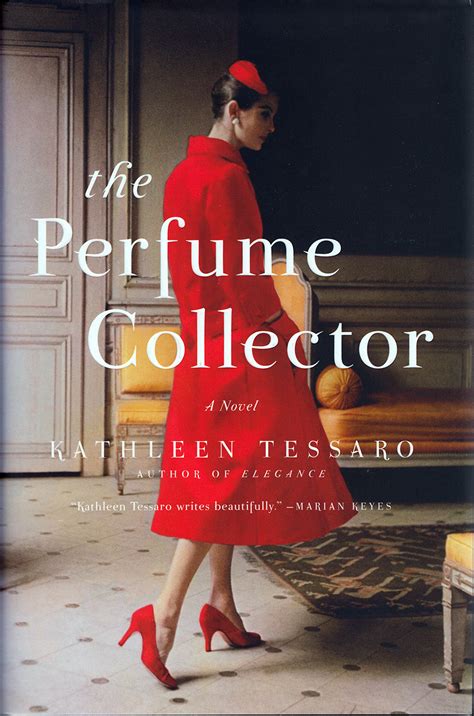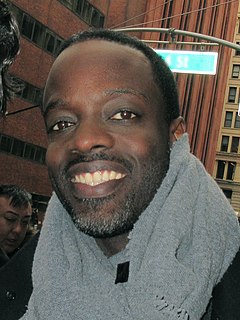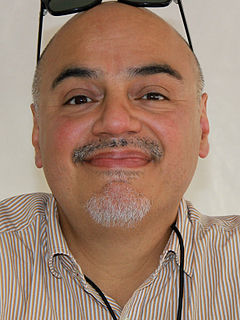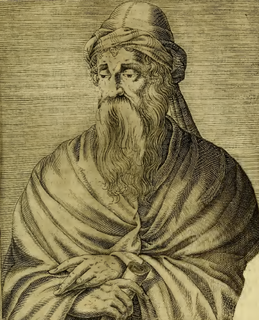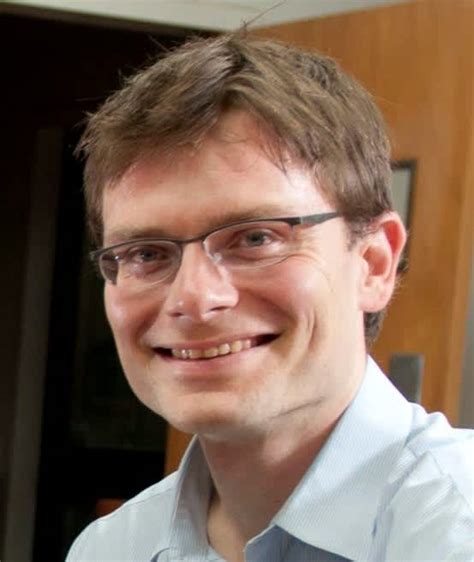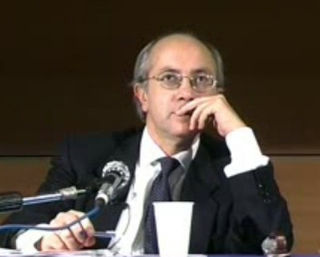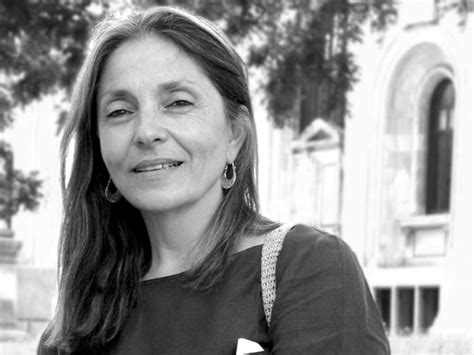Top 1171 Greek Yogurt Quotes & Sayings - Page 18
Explore popular Greek Yogurt quotes.
Last updated on November 16, 2024.
I remember a Greek player from Sevilla, Vassilios Tsiartas. He was the best free kick taker I have seen in my life, I think. I learned from him in training. I used to hit the ball, like, five metres from goal because I couldn't reach! But I remember him telling me, 'When you are 14, 15 years old, you will take free kicks like me.'
I never know who's influencing me at any time. I mean, I can take a play by Brecht and adapt it, I'm consciously adapting that play, or, as I've done with the Greek classics, Euripides and Oedipus, and I'm consciously adapting that play. Whether it influences me or not, I think it's the critics, the analysts who have to decide that. Me, I don't feel that I'm under the influence of any such sources.
There is nothing that has caused me to meditate more on Plato's secrecy and sphinx-like nature, than the happily preserved petit fait that under the pillow of his death-bed there was found no 'Bible,' nor anything Egyptian, Pythagorean, or Platonic - but a book of Aristophanes. How could even Plato have endured life - a Greek life which he repudiated - without an Aristophanes!
My parents were only one part of my lineage. I also met a number of mentors, one of whom I nicknamed "Socrates" after the ancient Greek, and wrote about in my first book, Way of the Peaceful Warrior. That book emerged in 1980, as a result of travels around the world and decades of preparation, eventually leading to 15 other books written over the years, culminating in my newest offering, The Four Purposes of Life.
Most people believe they know how they themselves think, how others think too, and even how institutions evolve. But they are wrong. Their understanding is based on folk psychology, the grasp of human nature by common sense ¾ defined (by Einstein) as everything learned to the age of 18 ¾ shot through with misconceptions, and only slightly advanced over ideas employed by the Greek philosophers
I think that the real tragedy of Greece - aside of the savagery of European bureaucracy, Brussels bureaucracy and northern banks, which was really savage - is that the Greek crisis didn't have to erupt. It could have been taken care of pretty easily at the very beginning. But it happened and Syriza came into office with a declared commitment to combat it, and in fact as I recall they actually called a referendum, which horrified Europe.
By being so long in the lowest form [at Harrow] I gained an immense advantage over the cleverer boys. . . . I got into my bones the essential structure of the ordinary British sentence - which is a noble thing. Naturally I am biased in favor of boys learning English; I would make them all learn English: and then I would let the clever ones learn Latin as an honor, and Greek as a treat.
The words 'theory' and 'practice' are of Greek origin; they carry our thoughts back to the ancient philosophers by whom they were contrived, and by whom they were also contrasted and placed in opposition, as denoting two mutually conflicting and mutually inconsistent ideas. ... [this fallacy] based on a double system of natural laws retarded for centuries the development of physical science, notably mechanics.
It's a curious thing, this thing we call civilization...we think it is an affair of epochs, and nations. It's really an affair of individuals. One brother will be civilized and the other a barbarian...All civilization comes through literature now, especially in our country. A Greek got his civilization by talking and looking, and in some measure a Parisian may still do it. But we, who live remote from history and monuments, we must read or we must barbarise.
In one sense, the Stanford prison study is more like a Greek drama than a traditional experiment, in that we have humanity, represented by a bunch of good people, pitted against an evil-producing situation. The question is, does the goodness of the people overwhelm the bad situation, or does the bad situation overwhelm the good people?
Not specifically. "Demons have been on Earth as long as we have. They're all over the world, in their different forms – Greek daemons, Persian daevas, Hindu asuras, Japanese oni. Most belief systems have some method of incorporating both their existence and the fight against them. Shadowhunters cleave to no single religion, and in turn all religions assist us in our battle. I could as easily have gone for help to a Jewish synagogue or a Shinto temple, or – Ah. Here it is.
[On the New Testament:] I ... must enter my protest against the false translation of some passages by the men who did that work, and against the perverted interpretation by the men who undertook to write commentaries thereon. I am inclined to think, when we [women] are admitted to the honor of studying Greek and Hebrew, we shall produce some various readings of the Bible a little different from those we now have.
Businesses will only invest in Greece if three conditions are fulfilled. First, there must be a clear commitment to the euro. No businesses will invest if they have to fear that Greece will leave the euro zone at some point. Second, the Greek government must be prepared to work together with European institutions in order to restructure the country.
Most people assume that a muse is a creature of perfect beauty, poise and grace. Like the creatures from Greek mythology. They're wrong. In fact, there should be a marked absence of perfection in a muse--a gaping hole between what she is and what she might be. The ideal muse is a woman whose rough edges and contradictions drive you to fill in the blanks of her character. She is the irritant to your creativity. A remarkable possibility, waiting to be formed.
It's funny because as much as I've done Dr. Freeman, I guess because I shave right afterwards, people don't recognize me necessarily as Dr. Freeman, whereas a small role like 'Garden State' or 'Get Him to the Greek', which is the funniest one to me, they're like, 'Hey, you're that dude!' and you're like, 'Oh my God!' Which is awesome.
The gods in Yoruba mythology are not remote at all. They're benign, they're malign, they are mischievous, like Eshu for instance, tricksters, rascally, fornicators, that's a similarity to Greek mythology, for instance, you know. They're not saints, they're not saints. They're powerful. It's why they're not tyrannical. Of course, a number of them are also very, you know, benevolent, you know, there are saintly virtues to be found in them.
The Gaia Hypothesis of James Lovelock [and Lynn Margulis] puts forward a scientific view of the living Earth, which in one respect is modern, empherical, scientific, in another respect re-awakens an ancient archetype, which in fact is so clearly suggested by the very name of the hypothesis, Gaia, the Greek name for Mother Earth.
Greek architecture taught me that the column is where the light is not, and the space between is where the light is. It is a matter of no-light, light, no-light, light. A column and a column brings light between them. To make a column which grows out of the wall and which makes its own rhythm of no-light, light, no-light, light: that is the marvel of the artist.
One question that has always intrigued me is what happens to demonic beings when immigrants move from their homelands. Irish-Americans remember the fairies. Norwegian-Americans the nisser, Greek-Americans the vrykólakas, but only in relation to events remembered in the Old Country. When I once asked why such demons are not seen in America, my informants giggled confusedly and said, 'They're scared to pass the ocean, it's too far,' pointing out that Christ and the apostles never came to American.
Rumors and reports of man's relation with animals are the world's oldest news stories, headlined in the stars of the zodiac, posted on the walls of prehistoric caves, inscribed in the languages of Egyptian myth, Greek philosophy, Hindu religion, Christian art, our own DNA. Belonging within the circle of mankind's intimate acquaintance ... constant albeit speechless companions, they supplied energies fit to be harnessed or roasted.
It is generally said, "Past labors are pleasant," Euripides says, for you all know the Greek verse, "The recollection of past labors is pleasant."
[Lat., Vulgo enim dicitur, Jucundi acti labores: nec male Euripides: concludam, si potero, Latine: Graecum enim hunc versum nostis omnes: Suavis laborum est proeteritorum memoria.
We need a name for the new replicator, a noun that conveys the idea of a unit of cultural transmission, or a unit of imitation. 'Mimeme' comes from a suitable Greek root, but I want a monosyllable that sounds a bit like 'gene'. I hope my classicist friends will forgive me if I abbreviate mimeme to meme. If it is any consolation, it could alternatively be thought of as being related to 'memory', or to the French word même. It should be pronounced to rhyme with 'cream'.
war with poison and chemicals was not so rare in the ancient world ... An astounding panoply of toxic substances, venomous creatures, poison plants, animals and insects, deleterious environments, virulent pathogens, infectious agents, noxious gases, and combustible chemicals were marshalled to defeat foes - and panoply is an apt term here, because it is the ancient Greek word for 'all weapons.
I can't tell you how lucky I feel. I've gotten to work Peter Facinelli 'American Odyssey,' and I got to do 'My Big Fat Greek Wedding 2' - which really gave me such a tremendous amount of pride and patriotism, and it was very close to my heart. I've really had such great support, so many great teachers, and so many wonderful people surrounding me.
You’re like a god from a Greek myth, Saiman. You have no empathy. You have no concept of the world beyond your ego. Wanting something gives you an automatic right to obtain it by whatever means necessary with no regard to the damage it may do. I would be careful if I were you. Friends and objects of deities’ desires dropped like flies. In the end the gods always ended up miserable and alone." — Kate Daniels
The Greek tragedies and comedies are like a roadmap to all the ways in which trying to live this rich, full life can go wrong. You could get into a war. You could find that you have members of your family on the wrong side of a political crisis. You could be raped. You could find that your child has gone crazy because of some horrible experience she's had.
When we started Appaloosa, we were going to name it Pegasus because everyone was using Greek names. We filed the name. We paid $300, and they said you cannot use it because it is taken. Pegasus Funds. Then we said Pegasus is kind of a horse. We did not want to be the Unicorn Fund. So we pulled out a horse book.
Creation is thus God's presence in creatures. The Greek Orthodox theologian Philip Sherrard has written that "Creation is nothing less than the manifestation of God's hidden Being." This means that we and all other creatures live by a sanctity that is inexpressibly intimate, for to every creature, the gift of life is a portion of the breath and spirit of God. (pg. 308, Christianity and the Survival of Creation)
I wish they would use English instead of Greek words. When I want to know why a leaf is green, they tell me it is coloured by "chlorophyll," which at first sounds very instructive; but if they would only say plainly that a leaf is coloured green by a thing which is called "green leaf," we should see more precisely how far we had got.
What we're trying to do as writers is rescue, preserve this space of thoughtfulness of language, of a deeper and more honest appreciation of our reality. And, so, we have to work even harder as writers against this tide of silliness, against this tide of superficiality, against this horrible Greek chorus on Twitter where everyone is insulting each other and now we have an insulter-in-chief, who's risen to the presidency by insulting people.
The word 'idiot' comes from a Greek root meaning private person. Idiocy is the female defect: intent on their private lives, women follow their fate through a darkness deep as that cast by malformed cells in the brain. It is no worse than the male defect, which is lunacy: men are so obsessed by public affairs that they see the world as by moonlight, which shows the outlines of every object but not the details indicative of their nature.
I have often come across convinced adepts of Greek mythology who mock our faith under the pretext that we do not say anything else to those whom we instruct in divine things, but merely command them to believe.
They accuse the apostles of ignorance, labelling them barbarians, because they do not have the subtlety of eloquence; and they say that the cult of martyrs is ridiculous, considering it completely absurd for the living to seek assistance from the dead.
What is an adjective? Nouns name the world. Verbs activate the names. Adjectives come from somewhere else. The word adjective (epitheton in Greek) is itself an adjective meaning 'placed on top', 'added', 'appended', 'foreign'. Adjectives seem fairly innocent additions, but look again. These small imported mechanisms are in charge of attaching everything in the world to its place in particularity. They are the latches of being.
We may say, in a broad way, that Greek philosophy down to Aristotle expresses the mentality appropriate to the City State; that Stoicism is appropriate to a cosmopolitan despotism; that stochastic philosophy is an intellectual expression of the Church as an organization; that philosophy since Descartes, or at any rate since Locke, tends to embody the prejudices of the commercial middle class; and that Marxism and Fascism are the philosophies appropriate to the modern industrial state.
THAT Perseus always won. That's why my momhad named me after him, even if he was son of Zeus ann I was son of Posidon. The original Perseus was one of the only heros in the greek myths who got a happy ending. The others died-betrayed, mauled, mutilated, poisoned, or cursed by the gods. My mom hoped i would inherit Perseus's luck. Judging by how my life was going so far, i wasn't too optimistic.
Political uncertainty around the world has more than doubled since the election of Trump. To find anything comparable we have to go way back, to the late 1920s for example, the times of the Great Depression. Or think of the United Kingdom in the 1970s, when the International Monetary Fund had to help the country out with a dramatic rescue operation. Up until the Greek crisis, that was the last time that the IMF was forced to intervene to such an extent in Europe.
The motive that impels modern reason to know must be described as the desire to conquer and dominate. For the Greek philosophers and the Fathers of the church, knowing meant something different: it meant knowing in wonder. By knowing or perceiving one participates in the life of the other. Here knowing does not transform the counterpart into the property of the knower; the knower does not appropriate what he knows. On the contrary, he is transformed through sympathy, becoming a participant in what he perceives.
At first critics classified authors as Ancients, that is to say, Greek and Latin authors, and Moderns, that is to say, every post-Classical Author. Then they classified them by eras, the Augustans, the Victorians, etc., and now they classify them by decades, the writers of the '30's, '40's, etc. Very soon, it seems, they will be labeling authors, like automobiles, by the year.
Excessively precise economic analysis can lead to assessing everything in terms of its easily measurable melt value - the value that thieves get from stealing copper wiring from isolated houses, that vandals got from tearing down Greek temples for the lead joints holding the marble blocks together, that shortsighted timber companies get from liquidating their forests. The standard to insist on is live value. What is something worth when it's working?
Not possessing definite geographical boundaries, at least in the East - its distinction from Asia is problematic, considering that two large countries, Russia and Turkey, stretch between the two continents - , Europe, from the beginning, has defined itself from the perspective of the constitutive specificity of its philosophical principles: the freedom of the Greek cities as opposed to the Asian despotic regimes. Although these principles were often contradicted and reversed into their opposite, the idea of Europe is inseparable from them.
Over the years, I have become convinced that Hellenism as a culture represents not a static condition of uniform sublimity mysteriously achieved and maintained as an effect of some racial advantage. Rather it should be understood as an evolving process, governed by a dynamic of change, as both language and thought underwent transformational alteration caused by a transition from orality to literacy. The instrument of change is discerned to be the invention of the Greek alphabet, at a quite late stage in the history of developing cultures.
In my head I actually think my songs are pop songs. I think, Damn, that's a pop song! I can practice in front of the mirror with my hairbrush for as long as I want to. But when it finally comes out, it sounds avant-garde to people. Right up until then, though, I think, "Of course everybody feels this way. This song's the same as the Greek national anthem."
I love how 'Game of Thrones' has resonated with so many people around the world. I feel like it has really tapped into our need to hear stories about the human condition, love, death, good, evil... For me, it really is a modern version of the old Greek theatre or cave men sitting around fires telling stories.
Indian monks were the first to choose the garden as the proper setting for their lives, which were devoted to the
contemplation of the divine; but with a prophetic eye we may see that the garden will often be dedicated in a
like manner: at a later time Greek philosophers, and monks in early Christian days, will retire into their
gardens for united, yet silent, contemplation.
If you teach the Negro that he has accomplished as much good as any other race he will aspire to equality and justice without regard to race. Such an effort would upset the program of the oppressor in Africa and America. Play up before the Negro, then, his crimes and shortcomings. Let him learn to admire the Hebrew, the Greek, the Latin and the Teuton. Lead the Negro to detest the man of African blood--to hate himself.
To write or even speak English is not a science but an art. There are no reliable words. Whoever writes English is involved in a struggle that never lets up even for a sentence. He is struggling against vagueness, against obscurity, against the lure of the decorative adjective, against the encroachment of Latin and Greek, and, above all, against the worn-out phrases and dead metaphors with which the language is cluttered up.
The Patriarch Joseph, after agreeing with the Latins that their formula of the Holy Ghost proceeding from the Son meant the same as the Greek formula of the Holy Ghost proceeding through the Son, fell ill and died. An unkind scholar remarked that after muddling his prepositions what else could he decently do?
[Pope Francis] continued to focus on migrants. He visited the Greek island of Lesbos, which was the front line of the European migrant crisis. And a month later, he accepted a prestigious European Union prize, but he scolded Europe for its treatment of migrants. And in a speech echoing Martin Luther King, he said I have a dream of a Europe where being a migrant is not a crime. So, yeah, he showed he can be quite outspoken on political issues.
Truth is, most of us contain a splashing, giggling, squealing child who knows without thinking that bare skin and water go together as wings go with air, roots with earth, and the phoenix with incendiary sun. And innocence belongs to us as it did to ancient Greek athletes, who never wore clothes for their footraces or boxing matches but rather oiled themselves until their nude bodies glistened in the sunlight.
Don't worry about your physical shortcomings. I am no Greek god. Don't get too much sleep and don't tell anybody your troubles. Appearances count: Get a sun lamp to keep you looking as though you have just come back from somewhere expensive: maintain an elegant address even if you have to live in the attic. Never nickel when short of cash. Borrow big, but always repay promptly.
Sandoz turned and accepted the book, looking at the spine. "Aeschylus?"
Wordlessly, Guiuliani pointed out the passage, and Emilio studied it a while, slowly translating the Greek in his mind. Finally, he said, "In our sleep, pain which cannot forget falls drop by drop upon the heart, until, in our own despair, againstour will, comes wisdom through the awful grace of God."
The first thing you notice about New Orleans are the burying grounds - the cemeteries - and they're a cold proposition, one of the best things there are here. Going by, you try to be as quiet as possible, better to let them sleep. Greek, Roman, sepulchres- palatial mausoleums made to order, phantomesque, signs and symbols of hidden decay - ghosts of women and men who have sinned and who've died and are now living in tombs. The past doesn't pass away so quickly here. You could be dead for a long time
If we want happiness, I think we should follow classic Greek wisdom and live with areté. The word directly translates as 'excellence' or 'virtue,' but has a deeper meaning — something closer to 'expressing the highest version of ourselves.' When we're showing up fully moment to moment, there's no room for regret/anxiety/disillusionment, just a whole lot of happiness. Here's to getting our areté on!
If there is a Greek exit from the Eurozone, I think the German elite will be quite pleased that they can then use that to restructure the Eurozone and make it a zone where only strong countries are allowed in. There would then be two tiers within the European Union, which is in fact already happening. But you cannot simply get rid of German control by raising the specter of the Third Reich. That's ahistorical.
The Greek word euphuia, a finely tempered nature, gives exactly the notion of perfection as culture brings us to perceive it; a harmonious perfection, a perfection in which the characters of beauty and intelligence are both present, which unites "the two noblest of things" - as Swift most happily calls them in his Battle of the Books, "the two noblest of things, sweetness and light."
Plotinus, when he thinks about mind or intellect, the Greek word is 'nous', he thinks about something that's very different, it's much more elevated and special, more abstract, you might say more philosophical than the very broad range of mental events that we talk about in contemporary philosophy of mind.
The Greek word for philosopher (philosophos) connotes a distinction from sophos. It signifies the lover of wisdom (knowledge) as distinguished from him who considers himself wise in the possession of knowledge. This meaning of the word still endures: the essence of philosophy is not the possession of the truth but the search for truth. ... Philosophy means to be on the way. Its questions are more essential than its answers, and every answer becomes a new question.













